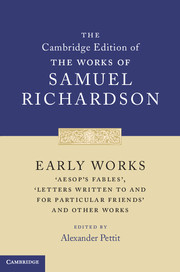Book contents
- Frontmatter
- Dedication
- Contents
- General Editors’ Preface
- Acknowledgements
- Chronology
- List of Abbreviations
- General Introduction
- Textual Introduction
- The Apprentice’s Vade Mecum (1733)
- A Seasonable Examination of the Pleas and Pretensions (1735)
- Preface to Aubin, A Collection of Entertaining Histories and Novels (1739)
- Aesop’s Fables (1739)
- Letters Written to and for Particular Friends (1741)
- Six Original Letters Upon Duelling (1765)
- Appendix: The Infidel Convicted (1731)
- Postscript
- Emendations
- Word-division
- Bibliographical Descriptions of Early Editions
- Explanatory Notes
- Index
Preface
Published online by Cambridge University Press: 30 June 2022
- Frontmatter
- Dedication
- Contents
- General Editors’ Preface
- Acknowledgements
- Chronology
- List of Abbreviations
- General Introduction
- Textual Introduction
- The Apprentice’s Vade Mecum (1733)
- A Seasonable Examination of the Pleas and Pretensions (1735)
- Preface to Aubin, A Collection of Entertaining Histories and Novels (1739)
- Aesop’s Fables (1739)
- Letters Written to and for Particular Friends (1741)
- Six Original Letters Upon Duelling (1765)
- Appendix: The Infidel Convicted (1731)
- Postscript
- Emendations
- Word-division
- Bibliographical Descriptions of Early Editions
- Explanatory Notes
- Index
Summary
We present the Publick with a Collection of Novels, written by the late ingenious Mrs. PENELOPE AUBIN, and published by her, at different times, singly, and with no small Success.
AMUSEMENTS of this Kind have always been highly approved of in the most polite Nations, both of Europe and Asia: For such is the Nature of the human Mind, that it cannot be satisfied without Variety; and religious Subjects themselves, though the noblest Entertainments of all others, will sometimes lose their Force and Efficacy, even on serious Minds, when too strictly imposed or pursued, and if nothing be admitted to diversify and amuse. Much more may Subjects of Diversion be needful to regale the gay and sprightly Fancies of the Youth of both Sexes, the Vivacity of whose Tempers, so natural to their Time of Life, require somewhat to allure, to amuse, and to entertain; and who cannot be long kept to any one Subject, though ever so noble or important in itself.
As these Kinds of Writings, then, are principally of Use to divert and entertain the Minds of young Persons, the following Rules ought to be inviolably observed in them. First, A Purity of Style and Manners, that nothing may be contained in them that has the least Tendency to pollute or corrupt the unexperienced Minds, for whose Diversion they are intended. Secondly, That the Subjects should be such as naturally recommend all the Duties of social Life, and inforce an universal Benevolence to Mankind. Thirdly, That when a guilty Character is introduced, it should in the Conclusion appear to be signally punished or distressed, that others may be deterred from the Pursuits of those Follies, or Mistakes, which have been the Occasion of its Misfortunes. Fourthly, That Virtue or Innocence, on the contrary, be not finally permitted to suffer; but that a Prospect at least should be opened, either here or hereafter, for its Reward, in order to encourage every one who reads it to Imitation. And, lastly, that the whole have, at least, an Air of Probability, that the Example may have the greater Force upon the Minds it is intended to inform.
- Type
- Chapter
- Information
- Early Works'Aesop's Fables', 'Letters Written to and for Particular Friends' and Other Works, pp. 94 - 98Publisher: Cambridge University PressPrint publication year: 2011

